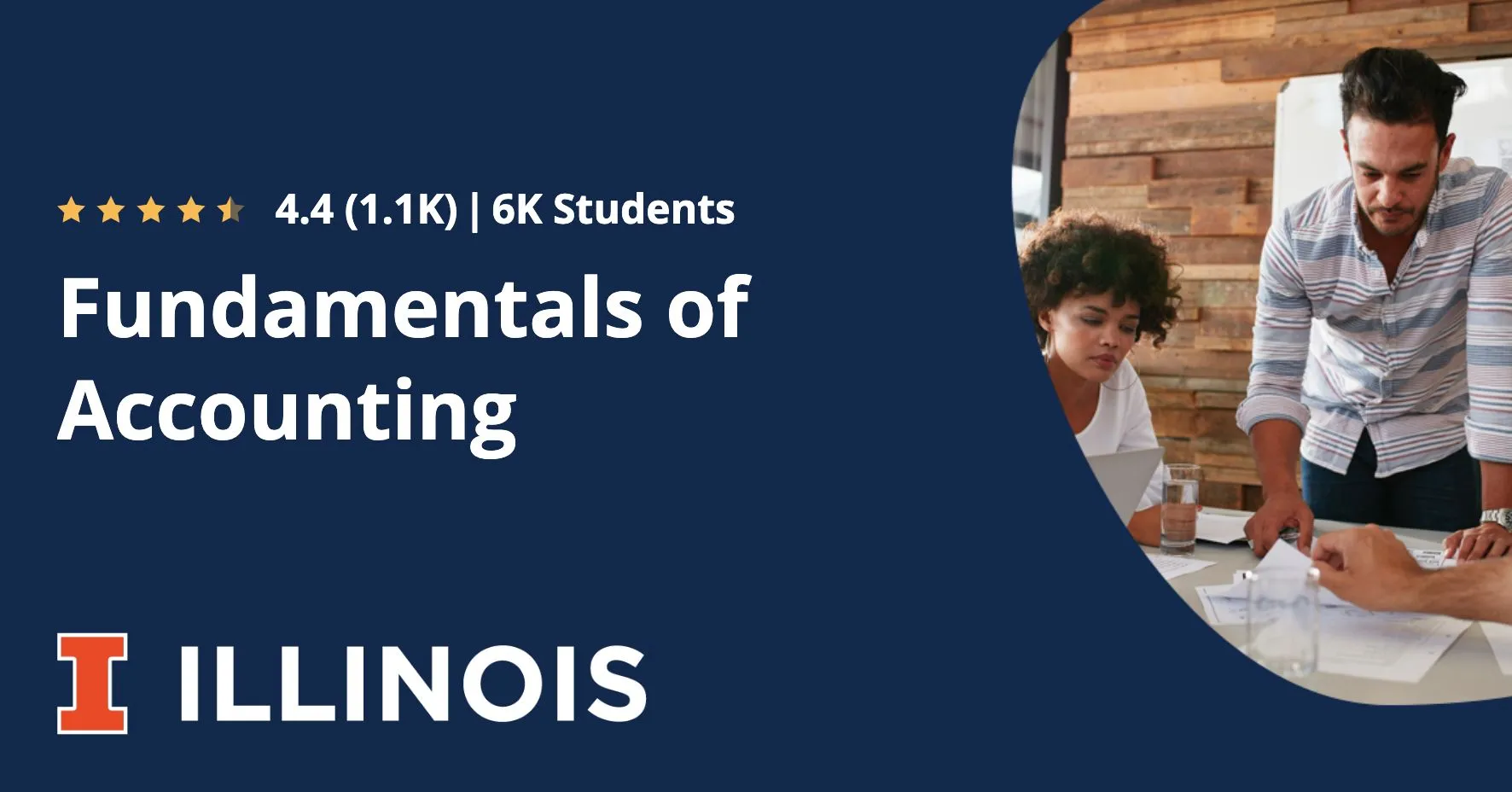
Fundamentals of Accounting 
Understanding the fundamentals of accounting is essential for anyone looking to gain insight into the financial performance of a business. This knowledge provides the tools to interpret financial statements and make informed decisions. ▼
ADVERTISEMENT
Course Feature
![]() Cost:
Cost:
Free Trial
![]() Provider:
Provider:
Coursera
![]() Certificate:
Certificate:
No Information
![]() Language:
Language:
English
![]() Start Date:
Start Date:
Self Paced
Course Overview
❗The content presented here is sourced directly from Coursera platform. For comprehensive course details, including enrollment information, simply click on the 'Go to class' link on our website.
Updated in [March 06th, 2023]
This course provides an introduction to the fundamentals of accounting. Students will learn about the income statement, cost, financial statement, balance sheet, accounting, accounting terminology, and financial ratio. Through lectures, discussions, and hands-on activities, students will gain an understanding of the basics of accounting and how to apply them in a business setting.
[Applications]
After completing this course, students should be able to apply the fundamentals of accounting to their own business or financial situation. They should be able to create and analyze income statements, cost statements, financial statements, balance sheets, and other accounting documents. Additionally, they should be familiar with accounting terminology and financial ratios. With this knowledge, students should be able to make informed decisions about their finances and investments.
[Career Paths]
1. Accountant: Accountants are responsible for preparing and maintaining financial records, analyzing financial data, and providing financial advice to businesses and individuals. They must be knowledgeable in accounting principles, financial reporting, and taxation. As the economy continues to grow, the demand for accountants is expected to increase.
2. Financial Analyst: Financial analysts are responsible for analyzing financial data and providing advice to businesses and individuals on how to make sound financial decisions. They must be knowledgeable in financial markets, investments, and risk management. With the increasing complexity of the global economy, the demand for financial analysts is expected to grow.
3. Tax Accountant: Tax accountants are responsible for preparing and filing tax returns for businesses and individuals. They must be knowledgeable in taxation laws and regulations, as well as accounting principles. As the tax code continues to become more complex, the demand for tax accountants is expected to increase.
4. Auditor: Auditors are responsible for examining and verifying financial records and statements. They must be knowledgeable in accounting principles, financial reporting, and auditing standards. As businesses become more complex, the demand for auditors is expected to increase.
[Education Paths]
1. Bachelor of Science in Accounting: This degree program provides students with a comprehensive understanding of accounting principles and practices. Students learn how to analyze financial statements, prepare taxes, and use accounting software. Additionally, they gain an understanding of the legal and ethical aspects of accounting. This degree is becoming increasingly popular as businesses become more complex and require more sophisticated accounting practices.
2. Master of Science in Accounting: This degree program provides students with an advanced understanding of accounting principles and practices. Students learn how to analyze financial statements, prepare taxes, and use accounting software. Additionally, they gain an understanding of the legal and ethical aspects of accounting. This degree is becoming increasingly popular as businesses become more complex and require more sophisticated accounting practices.
3. Master of Business Administration in Accounting: This degree program provides students with a comprehensive understanding of accounting principles and practices. Students learn how to analyze financial statements, prepare taxes, and use accounting software. Additionally, they gain an understanding of the legal and ethical aspects of accounting. This degree is becoming increasingly popular as businesses become more complex and require more sophisticated accounting practices.
4. Doctor of Philosophy in Accounting: This degree program provides students with an in-depth understanding of accounting principles and practices. Students learn how to analyze financial statements, prepare taxes, and use accounting software. Additionally, they gain an understanding of the legal and ethical aspects of accounting. This degree is becoming increasingly popular as businesses become more complex and require more sophisticated accounting practices.
Course Provider

Provider Coursera's Stats at AZClass
Discussion and Reviews
0.0 (Based on 0 reviews)
Explore Similar Online Courses

JavaScript Objects Course

Excel Essential Training (Office 365)

Python for Informatics: Exploring Information

Social Network Analysis

Introduction to Systematic Review and Meta-Analysis

The Analytics Edge

DCO042 - Python For Informatics

Causal Diagrams: Draw Your Assumptions Before Your Conclusions

Whole genome sequencing of bacterial genomes - tools and applications

Goods and Service Tax in India : A Brief Introduction

The Basics of Business Accounting


Start your review of Fundamentals of Accounting